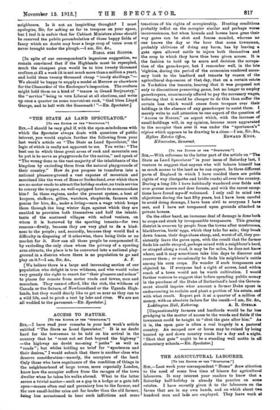[To TUB EDITOR OF THE " SPRCTATOR:9
SIR,—With reference to the latter part of the article on "The State as Land Speculator" in your issue of Saturday last, I venture to suggest that anyone who will behave himself has as much access to the land as he can expect. In three different parts of England in which I have resided there are public rights of way (footpaths and bridle roads) all over the country. During a long life I have habitually wandered over fields and over grouse moors and deer forests, and with the rarest excep- tions have found myself welcomed. I only call to mind two objections during the last fifty years, but I have been careful to avoid doing damage, I have been civil to everyone I have met, and I have not trespassed upon grounds attached to private houses.
On the other band, an immense deal of damage is done both to crops and stock by irresponsible trespassers. This grazing district is overrun by people from the towns after mushrooms, blackberries, birds' eggs, which they take for sale ; they break down fences, their dogs chase sheep, and, worst of all, they per- sistently leave the gates open, with the result that the farmer finds his cattle strayed, perhaps mixed with a neighbour's herd, or strayed along a road, it may be for miles, he does not know where, and it may sometimes take him days to discover and recover them ; or occasionally be finds his neighbour's cattle among his corn crops. No wonder if such trespassers are objected to. If everyone had a right of access, land within reach of a town would not be worth cultivation. I would further venture to suggest that before spending public money in the purchase of the Duke of Sutherland's land the Govern- ment should inquire what amount a former Duke spent in endeavouring to reclaim and plant a portion of his estate, and with what result. Report put it at a quarter of a million of money, with an absolute failure for the result.—I am, Sir, tie., [Unquestionably farmers and landlords would be far less grudging in the matter of access to the woods and fields if the townsman could be taught to " shut the gate after him." As it is, the open gate is often a real tragedy in a pastoral country. An escaped cow or horse may be ruined by being hunted up and down country roads for a day and a night. "Shut that gate" ought to be a standing wall motto in all elementary schools.—E D. Spectator.]






























































 Previous page
Previous page